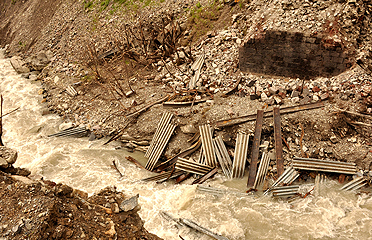| No Clarity over Destroyed Bridge, Border in Racha |
| Civil Georgia, Tbilisi / 21 Jun.'09 / 21:01 |

Remnants of destroyed bridge over Chanchakhi river in Racha province, about eight kilometers away from the Russian border. Photo: InterPressNews
An apparently blown up bridge in high mountainous region of Georgia, not too far from the Russian border, and reports about alleged pull back of Georgian border guards several kilometers deeper into the Georgian territory triggered wave of opposition’s accusations that the authorities were “covertly conceding territories to Russia.”
News broke on June 11 that the bridge over the Chanchakhi river was blown up and that the local residents of one of the nearby villages, Glola, were blaming the Georgian law enforcement agencies for that. According to the same reports, which was first disseminated by Davit Saganelidze of the opposition New Rights Party, who was citing local villagers, Georgian border guards pulled back deeper into the Georgian territory for up to 20 kilometers from the immediate vicinity of the Russian border, where they were usually patrolling and stationed.
The bridge, in the province of Racha, was on the road leading to the Mamisoni Pass on the border with Russia. The narrow and rocky road, a section of the Ossetian Military Road, which can be traversed only with off-road vehicles, has not been used for transportation purposes between Russia and Georgia for decades; it, however, is used by locals for reaching pastures.
The bridge was located close to the village of Gurshevi, about eight kilometers from Mamisoni Pass on the border with Russian. Now deserted village of Gurshevi, like the Mamisoni Pass, administratively was part of the former Autonomous District of South Ossetia, located on the north-western edge of its administrative border. But like Akhalgori district, which administratively was also part of the former Autonomous District, those areas were not under the South Ossetian secessionist authorities’ control. South Ossetian militias, backed with Russian troops, took over the control of Akhalgori after the August war.
Traditionally the Georgian border guards were patrolling border areas at the Mamisoni Pass seasonally, pulling back from the area during the winter and late autumn when the passes on the Caucasus Mountains become inaccessible because of snow.
There are two issues on which the allegations against the authorities are focused: blowing up the bridge and pulling back of border guards from the Mamisoni Pass.
Eyewitnesses, including a lawmaker from the parliamentary minority group, Paata Davitaia, who chaired the parliamentary ad hoc commission which studied the circumstances of the August war, say that evidence on the ground suggest the bridge was destroyed as a result of an explosion and it did not simply collapse because of its oldness, as initially suggested by some officials, including from the Interior Ministry.
There has been no clear answer from the authorities what has happened with the bridge. Officials, however, including local authorities and lawmakers from the ruling party, say that the bridge will be restored in the nearest future and the recent Georgian media reports indicate that the restoration works are about to start.
Another aspect of the story is location of the Georgian border guards. The local residents and the opposition say that the Georgian border guards are no longer stationed on the venues where they were traditionally deployed immediately at the Russian border, on the Mamisoni Pass.
In a statement released on June 15, the Georgian Interior Ministry said that the border guard police “fully control” this section of Georgian-Russian state border in the province of Racha, “as well administrational border of the so called South Ossetia.”
MP Paata Davitaia, who has traveled in the Racha region last week, said that the Georgian border guards were patrolling the border line. He, however, said that the border guards were not stationed at any particular place at the border, but moving from one location to another.
Mamuka Areshidze, a Caucasus affairs expert and a co-founder of House of Free Opinion, said at a news conference last week that the possible pull back of border guards from their previous positions could have been related with the Russia’s push to restore breakaway South Ossetia’s borderline in which it existed when it was an Autonomous District during the Soviet times. He said that pull back of border guards could have been conditioned with the Georgian authorities willingness to prevent clashes with Russians. He, however, said whatever the reason was the authorities should explain to the society what had really happened.
In a statement on June 19, Georgian Public Defender, Sozar Subari, said that this issue had become a source of speculation and called on the opposition and the authorities to put aside differences and to jointly probe into the reasons behind the destruction of the bridge and also to find out situation on the ground at Mamisoni Pass. Subari said that he was also ready to engage in work of a joint group if such was created by the authorities and the opposition.
